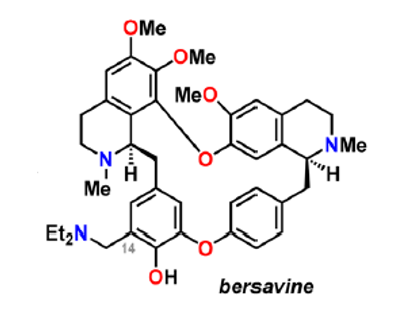Bersavine-Derived c-Myc Targeting Compounds as a Broad Anti-Cancer Therapy
Tech ID: 34144 / UC Case 2025-682-0
Background
A major driver in a number of cancers is the dysregulation and overexpression of c-Myc1. c-Myc is a crucial factor in cell metabolism, growth, division, and even programmed cell death, and its abnormal activity is found in many cancers, including various lymphomas. Because c-Myc has long been viewed as an “undruggable” oncogene, effective therapeutic strategies remain limited; for this reason, research aimed at finding viable ways to target c-Myc is both necessary and in high demand.
Brief Description
Professor Kevin Kou and his team at the University of California, Riverside, in collaboration with Professor Wendong Huang's lab at City of Hope, have developed a new method for synthesizing modified versions of bersavine. Using this method, several novel bersavine compounds were synthesized. When these new compounds were tested against lymphoma cells, powerful anti-cancer effects were demonstrated. Notably, these newly synthesized analogs are more effective at inhibiting cell growth than the naturally occurring bersavine.

Suggested uses
- A new synthetic route to enable the creation of new, potent bersavine derivatives for the treatment of cancer.
Patent Status
Patent Pending
Related Materials
Contact
- Grace Yee
- grace.yee@ucr.edu
- tel: View Phone Number.
Other Information
Keywords
CaMKII, CaMKII?, lymphoma, bersavine
